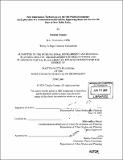New information technologies in the old political economy : an exploration of community-based GIS for improving basic services for the poor in New Delhi, India
Author(s)
Canepa, Claudia
DownloadFull printable version (23.50Mb)
Other Contributors
Massachusetts Institute of Technology. Dept. of Urban Studies and Planning.
Advisor
Bishwapriya Sanyal.
Terms of use
Metadata
Show full item recordAbstract
Rapid urbanization, limited neighborhood-level data, and the multiplicity of overlapping agencies in mega-cities in the developing world are creating a significant gap between citizens, particularly the poor, and government. Rising poverty rates have led NGOs and government actors to explore the role of community-based geographic information systems (GIS) in improving service provision to the poor. These participatory GIS applications focus on collecting neighborhood-level information directly from residents and providing this information to government for more need-based planning and policy-making. This thesis examines the development of three such applications in New Delhi, India, that illustrate the potential of participatory GIS production and implementation processes in strengthening communities and creating organizational change within government. However, these three projects also suggest that a stronger understanding of the political economy of information gathering and policy- making is needed if the use of resident perceptions and other types of local knowledge is to be institutionalized in government resource allocation and policy-making processes. Findings suggest, first, that, contrary to the popular belief that government lacks sufficient knowledge about the needs of the poor and that the role of participatory GIS is simply to inform "government," frontline workers have much information on the poor, and it is the higher-level officials who lack the knowledge. This knowledge differential highlights the need to deconstruct the state and consider the political economy issues that prevent information sharing between different levels of government. (Cont.) Second, due to differences in ideology between NGOs and government, these two actors collect data on the poor for very different reasons. These differences may act as major impediments to GIS co-production unless special processes are set up and intermediaries are brought in to help generate common motivations between the two groups. Third, the NGOs' participatory approach to gathering local knowledge, which is deeply rooted in the flexible nature of NGOs, contrasts sharply with the standardized data collection methods that government officials and policy-makers value. This contrast, coupled with the fact that policy-making processes are often structured in ways that prevent easy incorporation of local knowledge, presents a challenge for NGOs and governments who seek to work together to create more need-based planning and policy-making.
Description
Thesis (M.C.P.)--Massachusetts Institute of Technology, Dept. of Urban Studies and Planning, 2005. Includes bibliographical references (p. 217-223).
Date issued
2005Department
Massachusetts Institute of Technology. Department of Urban Studies and PlanningPublisher
Massachusetts Institute of Technology
Keywords
Urban Studies and Planning.